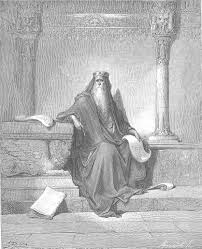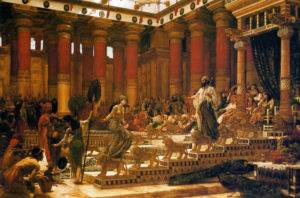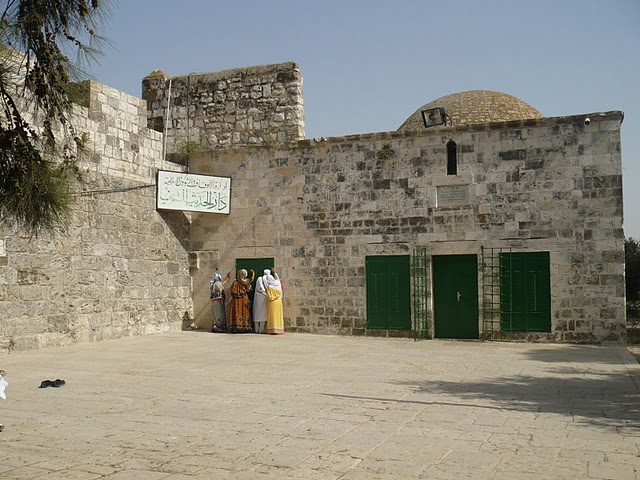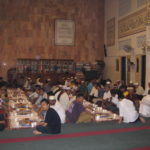Dawud, prophet and second king of the United Kingdom of Israel and Judah, had nineteen sons who all wanted to inherit his throne. With Allah’s guidance Dawud chose as his heir the youngest, Sulaiman, for his wisdom. When Dawud died, Sulaiman became prophet and king at the age of thirteen.
Allah received favourably the humble prayers of the new prophet, and granted Sulaiman knowledge of the languages of birds, and gave him power over animals, the Jinn, and men. These were marshalled before him in a great army. They made for Sulaiman anything the prophet desired; not only great buildings and statues but also water troughs and giant cooking pots. They raised for him a splendid palace of glass.
One day while out roaming with this army Sulaiman came to a valley full of ants. The lord of the ants grew alarmed at the approach of the army and commanded all the ants to hide underground. Sulaiman heard this command and told his army to wait, understanding that ants’ fear of being trodden on. But he chastised the lord of the ants. “Don’t you know who I am?” he asked. “I am a Prophet of Allah, and would never harm you unjustly.”
“It was not your harm I feared,” replied the lord of the ants, “but your army’s glory; which if my citizens saw, they would forget the glory of Allah.”
This reminded Sulaiman to remain humble before Allah.
Once Sulaiman was talking with the birds when he noticed one of them was absent. “Where is the hoopoe?” he asked, but none of the birds knew. The prophet became angry and declared he would punish the bird severely. Eventually, the hoopoe returned with news from the distant kingdom of Sheba.
“I found a woman called Bilqis ruling over the people, a woman who possesses everything, including a great throne,” the hoopoe told Sulaiman, who grew interested and began to think he wouldn’t punish the bird after all. But the hoopoe’s face screwed up in disgust. “This woman and her people worship the sun, not Allah, and the Devil has made this wickedness seem beautiful in their eyes!”
 Sulaiman gave a letter to the bird, who carried it all the way back to Sheba, and dropped it on the lap of the sun-worshipping queen. Bilqis opened it and read, “In the Name of Allah, Most Gracious and Most Merciful: Do not rise up in arrogance against me, but submit to the true religion.” She appealed to her chiefs for advice, and this they advised her:
Sulaiman gave a letter to the bird, who carried it all the way back to Sheba, and dropped it on the lap of the sun-worshipping queen. Bilqis opened it and read, “In the Name of Allah, Most Gracious and Most Merciful: Do not rise up in arrogance against me, but submit to the true religion.” She appealed to her chiefs for advice, and this they advised her:
“Decide yourself what you must do.”
Bilqis feared invasion from Sulaiman, and decided to send gifts of great value to appease this Prophet of Allah. But when her envoys arrived in Sulaiman’s kingdom they saw its magnificence and knew the gifts they bought were worthless.
“Why do you try to offer me wealth?” asked Sulaiman of the envoys. “What Allah has given me is more valuable than your wealth or all the wealth in the world.” He sent them back to Sheba and said they would be followed by his army, which would conquer them.
Sulaiman Being Confident of the queen’s Submission
He built a splendid palace made of glass to honour her arrival. Water was poured under its glass floor, and fish swam beneath it. The prophet asked his men which of them could bring him Bilqis’s throne before she came herself in surrender.
A Jinn said, “I will bring it to you before you can even rise from your chair.”
But a man with knowledge of the Scriptures said, “I will bring it to you in the blink of an eye!”
Sulaiman blinked and saw before him Bilqis’s throne. He ordered it to be transformed out of recognisable shape.
 When the queen arrived at the palace she found Sulaiman walking on water, and thought this must be the most powerful man in the world. But Sulaiman explained, “This is just a place of glass.” Bilqis wondered if all things that appeared powerful, like the sun, were not actually produced by greater things. Then Sulaiman showed the queen something that looked nothing like a throne and asked, “Is this your throne?”
When the queen arrived at the palace she found Sulaiman walking on water, and thought this must be the most powerful man in the world. But Sulaiman explained, “This is just a place of glass.” Bilqis wondered if all things that appeared powerful, like the sun, were not actually produced by greater things. Then Sulaiman showed the queen something that looked nothing like a throne and asked, “Is this your throne?”
When the queen said, “It appears to be so,” Sulaiman knew she had Allah’s guidance. Bilqis, amazed that her throne had arrived before her, recognized Sulaiman as a prophet and submitted to the power of Allah.
One day, after Bilqis had returned to Sheba a Muslim, a small boy approached Sulaiman while he was sat on his throne in his palace. “Who are you, and who allowed you in here?” the prophet asked the boy.
“I come with Allah’s permission, to take your life away,” said the angel.
Sulaiman nodded, and stood up, leaning on his staff. “Then fulfil your duty.”
His soul departed, but for a long time his body remained leaning against the staff. The Jinn, believing him still alive, continued in his service until an ant came and gnawed at his staff, so that the prophet’s body fell to the ground. Only then did the Jinn realise the reality that had been beyond their perception, and finally abandoned their servitude.






